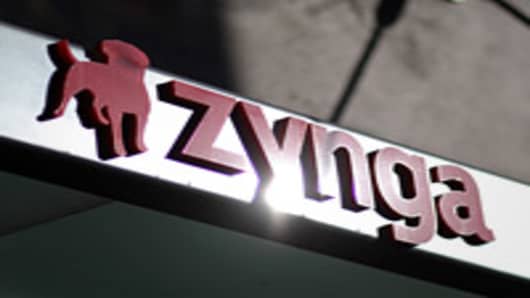Zynga’slong-anticipated IPO did not benefit from the same first-day bumps that LinkedIn and Groupon soaring higher earlier this year. The social gaming company raised $1 billion—issuing 100 million shares at $10 a share – making it the largest Internet-related IPO since Google’s $1.4 billion offering back in 2004. The $10 price was at the upper end of the $8.50-$10 range, valuing the company at around $7 billion, $8.9 billion including unexercised options and warrants.
Zynga’s valuation may be huge compared to video game giants Electronic Arts -- $6.9 billion—and Activision Blizzard -- $13.6 billion.
But it’s actually much smaller than expected. Earlier this year the company was valued at $14 billion – it sold shares to investors for around $14. Some industry watchers talked about a $20 billion valuation and some employees reportedly were granted stock options at a higher valuation than $14 billion.
As soon as Zynga priced Thursday night, it was clear that this stock would not see the massive first-day jump investors were trained to expect by LinkedIn and Groupon to expect. Yes, Zynga priced at the upper end of its range, but the company could have priced as high as $12 per share without re-issuing its S-1 SEC filing. And, on top of that, the company had the option of issuing an additional 15 million shares of stock. Yes, this means that the stock was priced accurately, but it also means that the company didn’t see the massive demand it was prepared to handle.
- Track Zynga in Real Time Here
So what went wrong? Zynga rare in its pre-IPO profits-- $90.6 million in 2010. But Wall Street seems to have soured on Internet fare. Groupon shares, after jumping 40 percent opening day from its $20 IPO price, fell to as low as $15 before rebounding a bit. And Pandora is pretty much flat from where it started trading in June.
Analysts have been piling on Zynga—warning about its growth prospects. Cowen & Co analyst Doug Creutz initiated coverage with a “Neutral” rating, warning that Zynga’s market share of Facebook gaming is declining and Facebook gaming growth is slowing. Stern Agee’s Arvind Bhatia, rated the stock a “sell”before it priced, warning about slowing growth and declining free cash flow.
Plus, while investors may be look to Zynga for access to the social media space, once Facebook goes public, Wall Street will no longer need that proxy. Check out my blog on that topic here:
Questions? Comments? MediaMoney@cnbc.com



